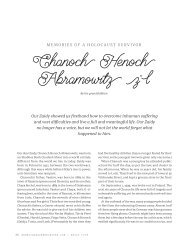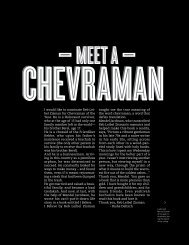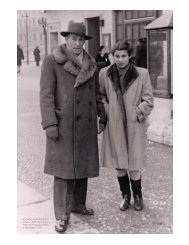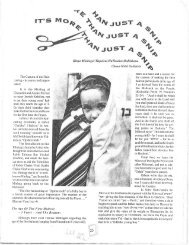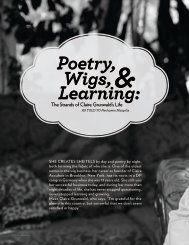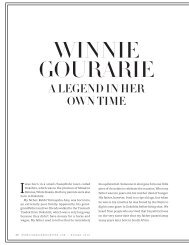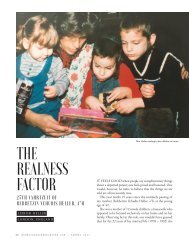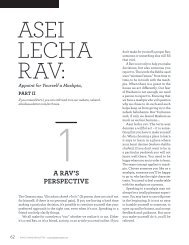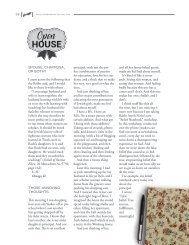“His Problem Is His Mother”
Create successful ePaper yourself
Turn your PDF publications into a flip-book with our unique Google optimized e-Paper software.
74<br />
The Menachem Wolff Collection/Lubavitch<br />
Archives<br />
<strong>“<strong>His</strong></strong> <strong>Problem</strong> <strong>Is</strong> <strong>His</strong> <strong>Mother”</strong><br />
A Gimmel Tammuz farbrengen reveals the essence of<br />
being a Lubavitcher today.<br />
Rabbi Eliyahu Alloy<br />
Do you really want to know what that bochur’s problem is?” asks the Rosh Yeshivah.<br />
“Yes, I do,” says the camp director. “I need to know. I can’t give him a job in my camp until I understand why he<br />
looks and acts the way he does.”<br />
The Rosh Yeshivah sighs, then speaks as if it hurts him to say the words. “He is a good bochur. He has a good<br />
head and can learn. He wants to do what’s right; he’s not rebellious. It’s just that — his problem is his mother.”<br />
<strong>His</strong> mother? The camp director is shocked – and puzzled. He knows the boy’s parents. They’re happily married<br />
and would do anything for their children. How can this boy’s mother be his problem?<br />
“She doesn’t understand the inner life of a bochur,” explains the Rosh Yeshivah. “ She doesn’t realize that<br />
by buying him a gift of a cell phone with internet, she is ruining him. She doesn’t realize that by sending him<br />
clothing that is different from what bochurim normally wear, she is making him ‘cool’ with all that comes along<br />
with that. When he was younger, she would have him wear a baseball cap over his yarmulke when they went to<br />
the mall or the park, so he would not appear overtly frum. She is busy making him worldly, when she should be<br />
making him other-worldly.”<br />
The camp director smiles sadly in understanding. “This world will find him. It’s the other world we have to make<br />
sure he’s attached to.”<br />
It’s not so difficult or mysterious for us women to raise our daughters; after all, we were girls ourselves once. But when<br />
it comes to raising sons, we need help. We need insight. We need direction. To that end, the N’shei Chabad Newsletter<br />
invites you to listen in on a boys’ farbrengen with Rabbi Eliyahu Alloy of Crown Heights.- Ed.
I<br />
was sitting and<br />
farbrenging with<br />
a group of young<br />
bochurim. Here is<br />
what I asked them:<br />
“There’s Reb<br />
Pinye, a well-known<br />
mashpia, a chassidishe<br />
Yid, separated from olam hazeh<br />
in every way, like a person who lived<br />
long ago. He is not wealthy. All he<br />
has in his life is davening, learning,<br />
and doing what the Rebbe wants. He<br />
is totally botul to the Rebbe’s will.<br />
Many (but only those) who have a<br />
chassidishe mindset would point to<br />
him as a success.<br />
“Then there is a second man who<br />
is also successful in a sense. He<br />
has a flourishing career as a Jewish<br />
leader, and has positively influenced<br />
many through his job in high<br />
office. He dresses well and is highly<br />
presentable. But he has obviously<br />
polished his image, and he is very<br />
cognizant of, and very much a part<br />
of, olam hazeh.”<br />
So I asked the bochurim: “Which<br />
of these two would you like to become<br />
when you reach adulthood?”<br />
Most of the boys chose the second<br />
individual.<br />
The fact that they feel this way<br />
reflects a general misconception and<br />
a common mistake concerning the<br />
avodah of this generation that many<br />
have. It’s an easy mistake to make,<br />
but it is a mistake.<br />
At a second farbrengen a few weeks<br />
later, with the same bochurim, I described<br />
another two men: Reb Zalman Dovid<br />
Hamliner and Reb Leib Sheinin.<br />
REB ZALMAN DOVID HAMLINER<br />
Reb Zalman Dovid Hamliner was a<br />
chossid of the Rebbe Rashab. He was<br />
in Yeshiva Tomchei Temimim in the<br />
city of Lubavitch. Reb Zalman Dovid’s<br />
mashgiach in nigleh was upset with<br />
him because he davened so long that<br />
he missed the entire seder nigleh.<br />
When the yeshiva moved from<br />
Lubavitch to Kremenchug at the end<br />
of WWI, Reb Herschel Gurary, a gvir<br />
in Kremenchug, gave the bochurim<br />
a place to live, and supported them<br />
fully. The gashmius was much better<br />
than it had been in Lubavitch. But<br />
the boys were dressed very simply.<br />
Here in Kremenchug they stood out<br />
because of it, but no attention was<br />
paid to that “problem.”<br />
Reb Hershel’s uncle, Reb Shmuel,<br />
asked the Rebbe Rashab for permission<br />
to buy the bochurim new clothing.<br />
He explained that in Lubavitch<br />
it was okay to appear almost in rags,<br />
but in Kremenchug, a big city, the<br />
standard was higher and the boys<br />
needed better clothing.<br />
The Rebbe Rashab pointed to Reb<br />
Zalman Dovid Hamliner, who was<br />
passing by at the moment, and he<br />
asked, “Voss fahr a tzureh vet Zalman<br />
Dovid hoben, oizgeputz?<br />
“What kind of impression will Zalman<br />
Dovid make, all dressed up?”<br />
REB LEIB SHEININ<br />
Reb Leib Sheinin learned in Lubavitch,<br />
and later became Rov of Dokszycs.<br />
The Rebbe Rashab once said, “It<br />
is bochurim like Leib Sheinin who<br />
make Tomchei Temimim what it is.”<br />
After meeting his future wife<br />
and deciding they would get married,<br />
Reb Leib returned to yeshivah<br />
and immersed himself completely in<br />
learning and davening to the point<br />
that the Rebbe Rashab had to remind<br />
him to go back, find out which date<br />
had been set for the wedding, etc.<br />
TODAY’S HERO<br />
Let’s take a Shliach today, a guy we’ll<br />
call Yanky. As a bochur he learned<br />
and davened and did what he had to<br />
do. Now, as a Shliach, he spends his<br />
time putting on tefillin with other<br />
Yidden, or bringing them the mitzvah<br />
of the day, or visiting Yidden in<br />
prisons and hospitals, or preparing<br />
and giving shiurim. <strong>His</strong> fundraising<br />
responsibilities are a heavy burden.<br />
Still, he makes sure to learn every<br />
day, and tries to daven properly.<br />
I asked the bochurim: Who is<br />
more removed from olam hazeh –<br />
the two bochurim in Lubavitch, Reb<br />
Zalman Dovid Hamliner and Reb<br />
Leib Sheinin, or this Shliach, Yanky?<br />
The bochurim replied unanimously<br />
that the bochurim of long ago<br />
are more removed from olam hazeh.<br />
After all, the Shliach has to dress<br />
properly. He has to polish his shoes.<br />
He has to know some current events<br />
in order to be successful in his Shlichus.<br />
He certainly relates more to the<br />
world than the chassidim of old. Right?<br />
NULLIFYING THE BALABATISHKEIT<br />
Herein lies the myth — the mistake<br />
that is unfortunately made by many.<br />
Notwithstanding his outer appearance,<br />
the Shliach is/should be and<br />
has to be far more removed from the<br />
material world than even the chassidim<br />
of long ago. Here’s why:<br />
Reb Zalman Havlin, one of the first<br />
temimim in Lubavitch, was, briefly,<br />
a mashpia in Horoditch, where there<br />
was a branch of Tomchei Temimim.<br />
The gvir of Horoditch very much<br />
wanted Reb Zalman Havlin to come<br />
to his house and farbreng. He wanted<br />
his children to see a true chassidishe<br />
farbrengen; he was hoping it would<br />
have a strong influence on them.<br />
Reb Zalman Havlin replied that<br />
he would do it on one condition. First<br />
he would have to pour the kitchen<br />
trash all over the house.<br />
The gvir was hesitant to agree<br />
to this condition, and asked Reb<br />
Zalman to please drop it, but Reb<br />
Zalman insisted that without this<br />
condition, there would be no farbrengen<br />
in the gvir’s home.<br />
Finally the gvir agreed.<br />
Reb Zalman came with his talmidim.<br />
The kitchen trash was strewn<br />
all over the house. Then they sat<br />
down to farbreng.<br />
The farbrengen was a true chassidishe<br />
farbrengen and it left a profound<br />
and lasting impact on the<br />
gvir’s children.<br />
Later, Reb Zalman explained that<br />
Chassidus is certainly not about dirt,<br />
disorder, and filth! But the gvir was<br />
a little too attached to his house,<br />
his image, his gashmius. Chassidus<br />
can only affect someone who<br />
is somewhat detached from olam<br />
september 2013<br />
75
hazeh. Reb Zalman knew he had to<br />
somehow nullify the balabatishkeit<br />
of the gvir a little bit; otherwise the<br />
farbrengen would not accomplish<br />
anything.<br />
A critical component of Chassidus<br />
and chassidishe thinking is that<br />
olam hazeh, and the balabatishkeit<br />
that comes with it, is ayin vo’efes<br />
– completely nothing and doesn’t<br />
really exist. For a chossid there is<br />
only one reality – the Eibershter, <strong>His</strong><br />
Torah, and <strong>His</strong> mitzvos.<br />
SEEING WHAT IS TRUE AND<br />
ETERNAL<br />
I heard the following from<br />
Reb Meilech Zwiebel of<br />
Morristown, NJ, about one<br />
of the commentators learned<br />
even by beginners: the Maharam<br />
(Moreinu Harav Meir).<br />
The Maharam often used<br />
the expression, “Makshim<br />
ha’olam.” It means, “The<br />
world asks.”<br />
How could he attribute<br />
a question on Tosfos to “the<br />
world”? It is only Gemara students<br />
who are concerned with<br />
this question. Why would he<br />
assume that “the world” cares<br />
or wonders or has any questions<br />
at all about Tosfos?<br />
To the Maharam, “the world”<br />
consisted of those people who sit<br />
and learn, or at least care about,<br />
Tosfos. The rest almost didn’t exist<br />
for him.<br />
There was once a chossid who<br />
visited Moscow, and then came to<br />
Lubavitch. The Rebbe Rashab asked<br />
him, “What’s doing in Moscow?”<br />
He replied, “I wasn’t really in Moscow,<br />
I just visited Reb Boruch Sholom<br />
Kahan.”<br />
The Rebbe Rashab replied, “What<br />
is Moscow? Reb Boruch Sholom is<br />
Moscow.” Reb Boruch Sholom and<br />
his avodas Hashem is the true reality<br />
of Moscow. Everything else is<br />
null and void.<br />
WHO IS SANE?<br />
Reb Leib Sheinin was once davening<br />
shacharis all the way til minchah time.<br />
At that point people began to gather<br />
for minchah, and soon there were ten<br />
people in the shul including Reb Leib.<br />
Reb Avrohom Paris was passing<br />
by, so they asked him to come and be<br />
the tenth man. When he came in and<br />
saw that there were already ten<br />
men, he asked, “Why do you<br />
need me?” The men<br />
pointed to Reb<br />
Leib Sheinin<br />
and indicated that they doubted<br />
his sanity and therefore didn’t think<br />
they could count him in the minyan.<br />
Reb Avrohom Paris smiled at this<br />
misunderstanding, and tried to show<br />
them their error. He asked, “Who is<br />
truly sane? The worldly perspective,<br />
which conflicts with Torah, views<br />
everyone else here as normal. But I<br />
know, with the mindset of Torah and<br />
Chassidus, that in truth it is davka<br />
Reb Leib Sheinin who is truly sane.”<br />
THE FOUNDATION OF A CHOSSID<br />
The chossid Reb Nison Nemanov<br />
used to say that the first requirement<br />
to be a chossid is to feel that<br />
it’s a given that G-dliness is what’s<br />
real and obvious, and the physical<br />
world has a questionable existence<br />
and only exists because it is discussed<br />
in Torah (Elokus b’pshitus;<br />
olam b’hischadshus). Every<br />
chossid might be at a different<br />
level and stage of the<br />
journey, but this attitude<br />
has to be everyone’s<br />
foundation.<br />
The Mitteler Rebbe<br />
explains in his hakdamah<br />
to his sefer Imrei<br />
Binah that the whole<br />
purpose of Chassidus<br />
Chabad is that people<br />
should internalize achdus<br />
Hashem (the Oneness of G-d)<br />
and realize that the world is<br />
just an extension of Hashem,<br />
with no independent existence<br />
and therefore no importance. The<br />
thousands of books and manuscripts<br />
that make up the Chabad<br />
library are really all just in order<br />
to help us internalize this one idea.<br />
THE CONCEPT IS ETERNAL<br />
The seventh Rebbe, our Rebbe, in<br />
the first maamar that he said as a<br />
Rebbe (Bosi Legani), explained that<br />
we are the seventh generation from<br />
the Alter Rebbe, and our avodah is<br />
to continue what the Alter Rebbe<br />
started (shvii lorishon).<br />
Even though nowadays the application<br />
of our avodah might sometimes<br />
be different from previous<br />
generations, and we are obligated<br />
to be “out there,” part of this lowly<br />
world, in essence we are the same<br />
as them and our goals are identical.<br />
Kuntres Eitz Chaim was written by<br />
the Rebbe Rashab, describing what<br />
the Yeshivah Tomchei Temimim<br />
should look like and how it should<br />
operate. The Rebbe pointed out that<br />
the Frierdiker Rebbe printed Kuntres<br />
Eitz Chayim here in the U.S.,<br />
which proves that here too the same<br />
76 n’shei Chabad Newsletter | nsheichabadnewsletter.com
ules and goals must apply. And in<br />
the year 5751 (1990), the Rebbe distributed<br />
this kuntres to be learned<br />
by all of us.<br />
Whatever is basic to the Chassidic<br />
mindset has not changed. The<br />
foundations are the same: Achdus<br />
Hashem, bitul ho’olam, negation<br />
of balabatishkeit and understanding<br />
that Elokus is the only true and<br />
important reality. These are all concepts<br />
that remain fundamental to a<br />
Chabad chossid.<br />
MAKING THIS WORK IN DOR<br />
HASHVII<br />
On a practical level, in our generation<br />
we have been asked by our Rebbe<br />
to bring Chassidus and the truth<br />
of Elokus into the wider world. To<br />
achieve this, we must get ourselves<br />
out there; engage in olam hazeh; be<br />
involved in material activities more<br />
than previous generations.<br />
But this does not in any way mean<br />
that our attitude to “veltishkeit” has<br />
suddenly changed. It does not mean<br />
that we have suddenly decided that it<br />
is important (or even permissible!) to<br />
integrate into the world around us. On<br />
the contrary! In order to achieve this<br />
mission we must be more detached<br />
(in our minds and hearts) from the<br />
world than previous generations.<br />
Other communities have chosen<br />
to remain sheltered from olam<br />
hazeh. Often we smile and declare<br />
that we are different. The lifestyle<br />
that the Rebbe carved out for us<br />
makes us more part of the world.<br />
For us, we might say, the world is<br />
more important.<br />
But in fact the exact opposite is<br />
true. To follow the Rebbe’s directives<br />
the world has to mean less, be less<br />
important to us, and we have to be<br />
completely detached from the world<br />
(notwithstanding that we operate<br />
within it!). Those Yidden who isolate<br />
themselves might be scared of<br />
“velt.” To them the world is still a<br />
force – a place that has the ability<br />
to negatively affect them. To do the<br />
Rebbe’s Shlichus and reveal Elokus<br />
in olam hazeh, the world must really<br />
mean nothing. We need to be able to<br />
exist in the world but live in a totally<br />
different mindset and reality – the<br />
world of Elokus.<br />
DON’T MAKE THE MISTAKE<br />
If someone goes on Shlichus and<br />
says, either out loud or in his heart,<br />
“We go on Shlichus because unlike<br />
others who say the world is not<br />
important, we feel it is important<br />
and we must integrate ourselves<br />
into the world,” then he has simply<br />
and profoundly and tragically<br />
missed the point<br />
That attitude isn’t even remotely<br />
connected with the seventh generation.<br />
It is the introduction of a new<br />
and foreign derech, G-d forbid.<br />
Dor Hashvii means to take the eternal<br />
truths taught by the Alter Rebbe,<br />
the Mitteler Rebbe, the Tzemach Tzedek,<br />
and reveal them to the “chutzah”<br />
— the wider world.<br />
Our world is and remains Ein Od<br />
Milvado. That is why we are able to<br />
go to a place where there is terrible<br />
klipah and stay fully and strongly<br />
connected with our Shlichus and<br />
the mishale’ach, and disconnected<br />
from the world we see around us.<br />
GOAL<br />
If you believe that the world is not<br />
important, that Chassidus is what<br />
matters, and everything is Elokus,<br />
then, first of all, there is no need for<br />
anyone to toss trash on your floor,<br />
and, second, you are a Chabad chossid<br />
and your Shlichus can be almost<br />
anything: Being a mashpia… teaching<br />
Torah and Chassidus… raising a<br />
family properly… opening your home<br />
to those in need… reaching out to<br />
our fellow Jews. One can fulfill any<br />
Shlichus as long as one has internalized<br />
that everything is Elokus and<br />
the world doesn’t matter. In fact, it<br />
barely exists.<br />
Our model is Reb Pinye, to whom<br />
the world is nothing. Our model is not<br />
the polished, worldly, well-groomed<br />
dignitary.<br />
We might need to operate differently<br />
from Reb Pinye. Everyone’s<br />
Shlichus, madreigah, talents and<br />
abilities are different. We all do different<br />
things, but we must all live in<br />
the same reality – Ein Od Milvado.•<br />
Post Script: Some members of<br />
the N’shei’s advisory board warned<br />
that this article was not right for the<br />
N’shei. What’s this about throwing<br />
garbage on the floor, they said, and<br />
what’s admirable about wearing old<br />
clothes? Why would we encourage<br />
girls to not care about appearance,<br />
about surroundings?<br />
They’re right. This article is not<br />
about raising girls. Women and girls<br />
should care about their clothing and<br />
their appearance; in fact the Rebbe<br />
davka wanted there to be mirrors in<br />
the dormitory of Machon Chana, and<br />
in Eishes Chayil we hear praise for<br />
the woman who wears – not a torn<br />
and faded housecoat, G-d forbid,<br />
but — fine linen and purple (shesh<br />
v’argaman levushah).<br />
And, yes, women who spend the<br />
time and energy to create clean,<br />
comfortable and organized homes<br />
are to be praised. The Rebbe said<br />
that a woman’s investment in the<br />
physical aspects of the home – from<br />
cleaning to cooking to caring for<br />
children to preserving the home’s<br />
aesthetic beauty – is elevated to<br />
holiness on par with the work of the<br />
kohen gadol.<br />
But we women are also raising sons.<br />
And so we have to know:<br />
For our sons these pursuits are different<br />
than they are for our daughters.<br />
We disagree with modern psychology or<br />
women’s lib or any other ism that says<br />
there’s no difference between raising<br />
boys and raising girls. Of course there<br />
is a difference, but it is still all l’shem<br />
Shamayim, not because the gashmius<br />
is important in and of itself.<br />
G-d forbid any Rosh Yeshivah should<br />
say about our sons, <strong>“<strong>His</strong></strong> problem is<br />
his mother.” –The Editors<br />
The N’shei Chabad Newsletter thanks<br />
Rabbi Michoel Gourarie for checking<br />
this article.<br />
september 2013<br />
77




